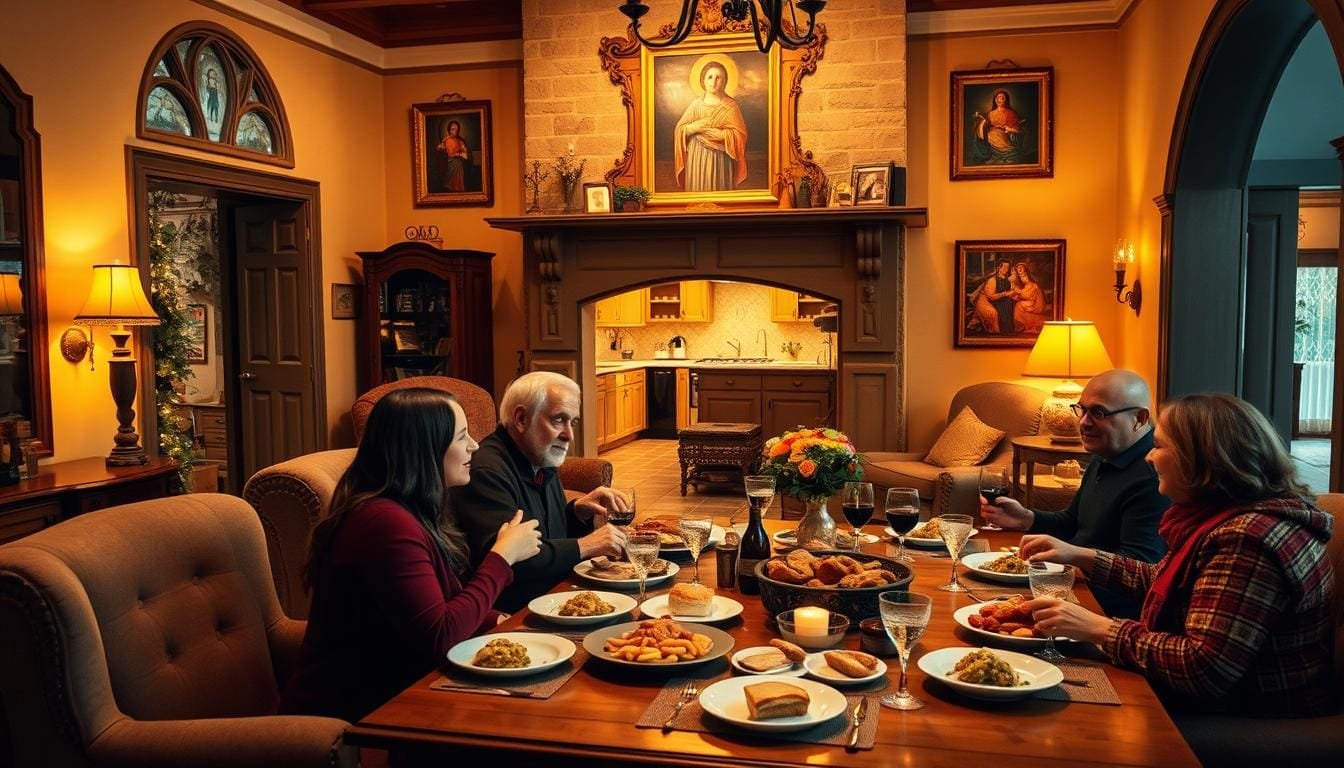Catholic Hospitality at Home
This website contains affiliate links. As an Amazon Associate, I earn from qualifying purchases. The content on this website was created with the help of AI.
What if hospitality isn’t about spotless homes or Pinterest-worthy table settings?
What if it’s really about seeing Christ in the tired guest, the unexpected visitor, or the neighbor who needs a place to sit and breathe?
The early Church modeled this in Acts 2:42—breaking bread, praying together, and welcoming others in a spirit of unity and simplicity.
Too often today, hospitality is confused with performance. But Catholic hospitality is something more profound; it’s a sacred invitation to love.
It’s not about gourmet meals or elegant decor; it’s about presence, kindness, and making space for others in our lives.
Scripture makes this clear: “You were strangers in Egypt” (Leviticus 19:33). The Gospel reminds us that welcoming others is central to the Christian life.
Whether it’s offering a meal, leaving a note of encouragement, or opening your door to someone in need, these simple acts echo the heart of Jesus.
St. John Paul II once said that hospitality should become a way of living, not a seasonal gesture.
From spontaneous dinners to quiet cups of coffee with a friend, every small effort teaches our children what love looks like in action—and helps build a home where Christ is truly present.
Key Takeaways
- Christian welcoming traditions are a spiritual practice, not a social obligation.
- Acts of kindness, like dietary accommodations or thoughtful playlists, turn homes into spaces of faith-filled connection.
- Jesus’ command to “welcome strangers” (Hebrews 13:2) transforms ordinary moments into encounters with the divine.
- Children learn about hospitality by watching their parents invite others into their daily lives, not just special events.
- A calm, Mary-like presence creates comfort, while rushed hospitality risks missing God’s presence in guests.
The Tradition of Catholic Hospitality Through the Ages
Christian hospitality history shows a faith that welcomes others. Early communities made homes sacred spaces for meals and prayers. This tradition guides our hospitality today.
Early Christian Hospitality Practices
In the first centuries, Christians welcomed strangers despite danger. The story of Abraham and Sarah hosting angels (Genesis 18) shows Jesus’ reliance on hospitality.
His words, “Foxes have dens, but the Son of Man has nowhere to rest” (Matthew 8:20, NAB), call us to welcome others.
Early Christians left food for the poor in fields (Leviticus 19:9-10). This act shows God’s command to care for the vulnerable.
Monastic Contributions to Hospitality
Monasteries were key to Benedictine hospitality. St. Benedict’s Rule said, “All guests are Christ,” guiding monastic life. They offered shelter, meals, and spiritual guidance to travelers.
These efforts helped create medieval hospitality networks. They ensured pilgrims had safety and food.
The Saints Who Exemplified Welcome
Saints showed radical hospitality. St. Elizabeth of Hungary secretly fed the poor, and St. Nicholas helped families without being known. St. Philip Neri’s home was a place where young people could learn about the faith.
Their stories teach us that hospitality builds community.
“Welcoming those in need is essential for meeting Christ face to face,” said Pope St. John Paul II.
| Saint | Example | Legacy |
|---|---|---|
| St. Elizabeth of Hungary | Shared meals with the hungry | Patron of Christian charities |
| St. Nicholas | Gifts for the poor | Symbol of anonymous generosity |
| St. Philip Neri | Opened home for spiritual guidance | Founder of oratory communities |
These examples demonstrate that saintly hospitality is a reflection of God’s heart. Let their stories guide us in making our homes welcoming today.
Biblical Foundations for Opening Our Homes
At the heart of Biblical hospitality is welcoming strangers as Christ would. Abraham showed this by feeding three travelers (Genesis 18:1-8).
This shows how Scripture hospitality starts with action. Leviticus 19:34 also says, “The alien who resides with you shall be to you as the citizen among you,” making it a divine law.
“Do not neglect to show hospitality to strangers, for by this some have entertained angels without knowing it.” (Hebrews 13:2)
Jesus’ ministry was all about radical inclusion. The Christian welcome bible shows Him eating with tax collectors and sinners.
This turned society’s norms on their head. Matthew 25:35 says welcoming strangers is key: “I was a stranger and you welcomed me.” This teaching ties hospitality to loving God.
- The Greek term “philoxenia” (friendship of strangers) combines “philo” (love) and “xenos” (stranger), revealing its profound meaning.
- Jesus’ post-resurrection recognition at Emmaus (Luke 24:30-31) is like the Eucharist. Sharing a meal shows His presence.
- Early Christians were so dedicated that 1 Timothy 3:2 even lists hospitality as a qualification for leadership.
These stories teach us that Jesus’ teaching on hospitality makes meals and shelter acts of faith.
When we open our homes, we join God’s story of redemption. Let’s take on this sacred duty, knowing every stranger we meet is a call to love as Christ loved.

Catholic Hospitality as a Spiritual Practice
Spiritual hospitality transforms every meeting into an opportunity to encounter Christ.
Henri Nouwen teaches us that welcoming others makes our homes places of God’s love. This practice turns daily life into prayer.
Welcoming Christ in the Stranger
Welcoming a guest is like welcoming Christ, as the Rule of St. Benedict teaches. This view changes hospitality from a duty to a devotion.
Let’s look at how different cultures practice hospitality:
| Culture | Practice | Spiritual Insight |
|---|---|---|
| American | Shared meals | Feeding body and soul |
| Indian | Serving without shared seating | Honoring dignity through service |
| Mary & Martha | Conversation vs. service | Balance in loving action |
Hospitality as Prayer
Preparing a meal or setting up seating can be a form of hospitality prayer with purpose. The Brothers of Saint John of God saw hospitality as a sacred vow. Here’s how to deepen this practice:
- Start with a prayer before welcoming guests.
- See food as a way to express gratitude to God for His gifts.
- End by thanking God for the chance to serve Christ in others.

Creating Sacred Space
A sacred home space begins with purpose. Light a candle, display a crucifix, or say grace. These actions remind us that our home is a temple of welcome.
Even small acts, such as keeping a spare blanket, demonstrate our faith.
Remember, sacredness is not about being perfect but being present. As St. Teresa of Calcutta said, “Faith becomes love lived.”
Let your home be a place where Christ’s love shines, no matter its size or style.
Practical Ways to Practice Hospitality in Your Catholic Home
Hosting others doesn’t need to be perfect. Start with something simple, like sharing a meal or opening your door.
These actions reflect Christ’s call to love one another as He has loved us (John 13:34). Begin with simple traditions that foster a sense of community.
“Let love be without hypocrisy. Abhor what is evil; cling to what is good.”
– Romans 12:9
Serving with Purpose: Sunday Dinners and Fellowship
Hosting dinner can be as easy as a weekly potluck or themed meal. The Reynolds family made their dining table a place of welcome, hosting over twenty guests.
Their story shows how small acts can create strong community bonds.
Hosting Prayer Groups and Bible Studies
- Utilize hosting prayer group formats, such as Scripture discussions paired with light snacks.
- Follow guidelines from PracticalCatholicLiving to create inclusive spaces.
- Begin with shared readings, such as the Rosary or Stations of the Cross, to build a spiritual connection.
Welcoming New Parish Members
Parish hospitality begins with a smile and a name tag. Offer to drive new families to Mass or host them for coffee.
The Reynolds’ parish grew when they paired newcomers with established families, creating a sense of belonging through shared meals and events.
Supporting Families in Need
When a neighbor faces hardship, a meal or a listening ear is a sacred service.
Casa Alma’s program shows that even short-term housing or childcare support honors Christ in the vulnerable.
Their Catholic home gatherings demonstrate that generosity grows through consistent, loving action.
Creating a Warm and Faith-Filled Atmosphere
“Be present. Be attentive to the present moment. Strive to host more like Mary and less like Martha, ‘anxious and worried about many things’ (Luke 10:41).)”
A welcoming Catholic space starts with careful planning. Choose sacred art and faith-filled decor thoughtfully. Place a crucifix in areas where people talk, or icons of saints, to spark interest.
A small Marian garden or a rosary on the table can easily start conversations. Hang liturgical calendars, use candles for special times, and display a Bible or prayer book for shared readings.
- Hang liturgical calendars to mark seasons of prayer
- Use candles for Advent or Lenten reflection
- Display a Bible or prayer book on a sideboard for shared readings
The Archdiocese of Louisville’s Christian Hospitality handbook states, “Hospitality starts with attitude.”
A clean home is essential, but a calm host is more crucial. St. Benedict’s Rule teaches kindness through “sitting with them,” emphasizing connection over perfection.
Engage your guests’ senses softly. Bake bread in Lent to warm homes, or play Gregorian chants during gatherings.
Say a mealtime prayer aloud to unite everyone. When guests leave, offer a blessing, such as “May God’s peace walk with you,” to show kindness quietly.
- Leave space at the table for unexpected guests
- Use natural light to brighten shared spaces
- Include quiet corners for reflection
The Holy Spirit can transform any space with open hearts. Make your welcoming space a place where Christ’s love is shown through small acts of kindness.
Aim for a space where everyone feels loved and valued, not a museum of faith.
Overcoming Obstacles to Genuine Hospitality
Busy lives, tight budgets, and concerns about maintaining a clean home often prevent us from hosting. Yet, Scripture tells us: “Do not neglect to show hospitality” (Hebrews 13:2).
“Mary has chosen the better part” (Luke 10:42) – a truth that frees us from perfectionism. Let’s turn these obstacles into chances to live our faith.
Begin with simple Catholic gatherings, such as weekly coffee or potluck dinners. Even 30 minutes can help build a sense of community.
For those with busy lives, share hosting duties with friends to ease the burden.
- Adapt meals: Choose easy dishes like soups or casseroles, and pair them with bread from your local parish bakery.
- Embrace “imperfect home hospitality” – a messy playroom or mismatched dishes are less critical than your company. As Dorothy Day said, radical hospitality starts with welcoming as if Christ were at the door.
- Utilize budget-friendly Catholic hospitality ideas, such as shared grocery lists or craft nights using supplies you already have at home.
Churches like University City United Methodist demonstrate that small actions, such as offering free meals or hosting worship services tied to community interests, can create significant connections.
When we focus on being present rather than perfect, we show love in real ways.
Remember, it’s the imperfect efforts filled with love that the Body of Christ needs most.
Conclusion: Hospitality as a Witness to Catholic Faith
Catholic witness and hospitality have always been key in sharing the faith. Emperor Julian saw how early Christians drew people to Christ by showing love.
Today, we’re called to make our homes a part of the Church’s mission.
By inviting neighbors or hosting prayer groups, we follow a long tradition of simple, sincere evangelization.
Ann Marie’s work demonstrates how small acts can have a significant impact. Simple acts, such as sharing meals or listening, can open doors to others.
The College Theology Society’s conference in Latrobe, PA, demonstrated the power of embracing diverse views.
Just as Mary and Elizabeth welcomed each other, we can too. Our homes can be places of radical welcome, turning strangers into friends.
Hebrews 13:1 tells us to keep loving one another. This isn’t just a duty; it’s an invitation to let Christ’s love shine through us.
Every welcome, every shared meal, is a chance to preach without words. John Chrysostom taught that genuine hospitality is about choosing love over comfort.
Let’s make our homes places of care, just as the early Church did. Let every encounter be an opportunity to live your faith, not just talk about it.








